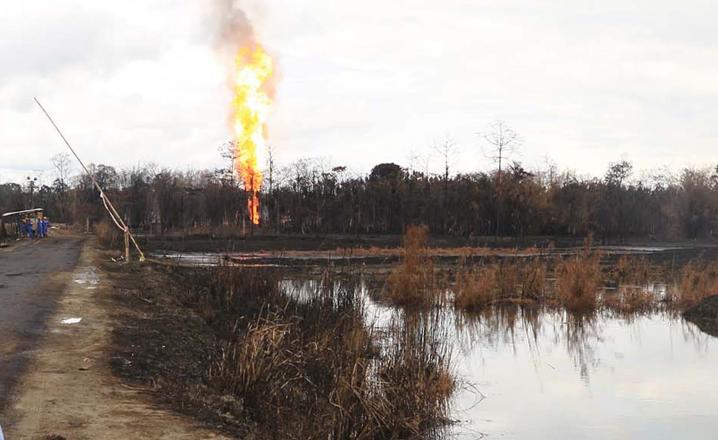As someone who was eased out of Oil India 35 years ago, I may not be very objective in my views about the Blow out at the Baghjan 5 well. However, the virtual free-for-all journalistic gesticulations going on in the print and AV media were too tempting for me to keep my mouth shut.
Oil India Limited (OIL) today is one of the most profitable Central Public Sector units in India. It has received many awards of excellence, including Safety awards. It has a historic legacy, being the true inheritors of the Assam Railway and Trading Company’s pioneering oil exploring efforts back in mid nineteenth century, culminating in the formation of Assam Oil Company which was taken over by the Burmah Oil Company (BOC) and later on, formation of the joint venture Oil India (which was a joint venture between BOC and Government of India), which was fully nationalized in early 1980s.
When I was there in the 1970s and eighties, the company was replete with operational procedures and norms that emphasised safety and alertness. Bulk of the staff was deployed most of the time in the sprawling field installations spread all over the country side. The organisation was lean in structure and response time to situations was minimal. It was highly decentralized with delegation with authority and responsibility being the norm, and the culture amongst the staff, which was very well trained, was that of ownership. Professionalism was the overriding factor. During my time, there were blowouts during exploratory drillings in Jorajan 2, and Tengakhat NHK 272 wells. They were handled with professional aplomb, with least bit of flutter and distractions.
The discovery of the Baghjan Field in the beginning of this century was indeed fortuitous for Oil India. This field is apparently very prolific and rich in both oil and Gas and helped in bolstering OIL’s performance. This field is located in an eco-sensitive zone; but OIL oil-fields have been mostly located in outlying areas where the ecology is indeed fragile and the Company has ample experience of dealing with environmental concerns.
Normally blowouts occur when one is drilling for exploration of oil in new areas where one may not be hundred percent sure about the geology a few kilometers below the surface. The Baghjan field has been in production for more than a decade. The sub-surface geology of the field, three to four kilometers below the surface, must have been well known. So, there is remote possibility of attributing the blowout to geological uncertainties.
What has surprised me is that the blowout occurred when “workover” was going on upon the concerned well. Workover is just like taking your car to a garage for servicing or repairs. A producing well, like the Baghjan well, requires periodical servicing, minor repairing or carrying out operations to improve performance. In this case, as per reports, workover was being done to augment gas production. This seems to be a routine operation, following standard safety and operational norms and procedures. There is a huge chance that the mishap occurred due to human error, misjudgment or lack of surveillance. Chances of equipment failure appear to be minimal.
No doubt, a High Powered Committee will be able to determine the cause of the blowout, fix responsibilities and recommend follow up actions. Also, scientific methods are available to assess the damages to the surrounding areas and the people. Compensation will be calculated and paid by OIL to the effected parties. The damage to the ecology will be substantial, but I know that nature is resilient: most of it would be restored in course of time. Following the “polluter pays” principal, OIL will have to pay for accelerating the restoration process.
It is heartening that the fire has been contained; it has been stopped from spreading. For the next three four weeks, it has to be ensured that the fire is not allowed to spread. The fire has ensured that the condensates that the well was sprouting burns away and does not settle down in the adjoining areas, which would have further damaged the surrounding ecology.
Experts are on the job. The job will take time. Till then, the most prudent thing would be to let the experts do their job in peace. It would be a risky operation, extreme caution would be required. Discussions based on conjectures or inadequate information and knowledge would lead us nowhere, may even jeopordise the efforts.
Long ago, a similar blow out took place in a oil well in ONGC’s Rudrasagar fields, right next to the Assam Trunk Road. The fire kept burning merrily for more than a month, before it could be doused with the help of foreign experts. Those were the days when there was no AV medium, the local print media was led by matured journalists and agitation had not become a competitive activity. There was hardly any ripple, in fact I was told that car owners from Guwahati used to drive down to have a ‘look see’ of the fire as a pastime. There were hardly any permanent scars left around the site.
But the scenario is entirely different this time. Everyone who feels to be someone has jumped into the fray. TV Channels are having endless discussions with opinionated ‘experts’ on the basis of conjectures and speculations, creating a distressful atmosphere of panic and frightening alarm. I doubt the people of Assam, the descendents of those who withstood eighteen Mughal invasions, are really so panic stricken (aatangkit) or are feeling as helpless as it has been made out in the media. The tragedy is that the narrow fields of journalistic reporting and agitational politics in Assam have become highly competitive. Negativity has been identified by the plethora of players in these two fields as the only way to survival. Even in Covid Pandemic reporting, it appears spreading panic and fear seems to be the motive.
Urging help from the defence forces, insisting on VIP visit to the accident sites,promising setting up of institutions in the affected areas without any need assessment and capex considerations are childish demands and gestures. They only add to the cacophony.
My heart goes out to the families of the two Fire personnel of OIL who died due to drowning when the well caught fire. I also feel distressed at the difficulties faced by those people whose habitat and source of sustenance have been destroyed permanently in the mishap. I am sure, OIL will adequately compensate all those who have been affected and take care of them and their dependents in their rehabilitation. Meanwhile, once the reports are out, OIL will introspect how the mishap occurred, where it may have gone amiss and ensure that such accidents will not take place again.
The area where the blowout has taken place is indeed very familiar to me. I had visited my friends, Tuman Barua in Deamoolie TE and late Dinesh Bhuyan at Baghjan. Some years back, I also visited my old Student, Rangan Bhuyan at Dighul Turrang TE. The pristine subtlety of the place is indeed fascinating. I also pray that nature in that area redeems itself and the bio diversity is restored in the shortest time possible.
Meanwhile, let those who know the job do the job without hindrance or distraction.
- 11169 reads










Add new comment